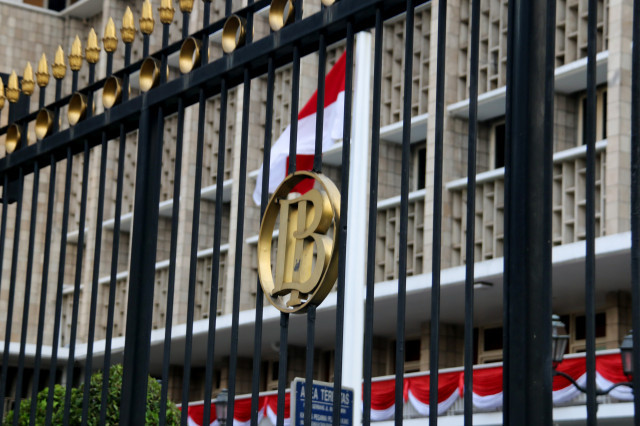Popular Reads
Top Results
Can't find what you're looking for?
View all search resultsPopular Reads
Top Results
Can't find what you're looking for?
View all search resultsBank Indonesia cuts rate, revises down growth target amid virus outbreak
BI slashed its benchmark interest rate, the BI seven-day reverse repo rate, by 25 basis points to 4.75 percent.
Change text size
Gift Premium Articles
to Anyone
B
ank Indonesia (BI) decided on Thursday to cut its benchmark interest rate to help mitigate the potential impacts of the coronavirus outbreak on the country’s economic growth.
During a two-day board of governors meeting, the central bank decided to slash its benchmark interest rate, the BI seven-day reverse repo rate, by 25 basis points to 4.75 percent after holding the rate last month.
“The monetary policy remains accommodative and consistent with the projected inflation rate and is a pre-emptive measure to maintain the momentum of domestic economic growth amid a stagnated global economic recovery caused by the coronavirus,” BI Governor Perry Warjiyo told a press conference in Jakarta on Thursday.
BI also lowered its deposit facility rate to 4 percent and its lending facility rate to 5.5 percent.
The benchmark rate will transmit into interest rates that affect consumer loans, corporate loans and mortgage interest rates as well as bond yields, among other things.
Since it was first detected in the Chinese city of Wuhan in late December, the pneumonia-like COVID-19 had killed more than 2,000 people, including 10 outside mainland China, as of Thursday, with the virus spreading to 30 countries and territories around the world, infecting more than 75,000 people.
The outbreak has disrupted economic activity in China, the world’s second largest economy and one of Indonesia’s major trading partners, as factories and companies close all or half of their businesses to contain the spread of the virus amid lockdowns in several provinces. Economists have projected that the situation could lower China's economic growth by up to 1 percentage point this year.
“A drop of 1 percentage point in China’s economic growth will result in a drop of 0.3 to 0.6 percentage points in Indonesia’s [growth],” Finance Minister Sri Mulyani said during a separate press briefing in Jakarta on Wednesday.
Indonesia’s economy grew 5.02 percent last year, slower than the 5.17 percent recorded in 2018, as investment and exports cooled.
The central bank cut its benchmark rate by a total of 100 basis points (bps) last year to help drive economic growth after making a steep 175 bps increase in 2018.
“The impact of the COVID-19 outbreak on the economy will be v-shaped, and we forecast global economic growth to reach 3 percent in 2020, down from our earlier projection of 3.1 percent,” said Perry, adding that global growth would pick up to 3.4 percent from BI’s earlier projection of 3.2 percent next year.
BI on Thursday also revised down Indonesia’s economic growth projection to between 5 and 5.4 percent this year from its earlier projection of between 5.1 and 5.5 percent.
“It will pick up to 5.2 to 5.6 percent in 2021,” Perry said.
Researchers from the University of Indonesia’s Social and Economic Research Institution wrote that the outbreak could potentially have an indirect impact on Indonesia’s economy through three channels, namely the financial market, the real sector and the government sector.
“We predict the outbreak to contribute a potential 10 to 30 bps correction to Indonesia’s GDP growth rate in 2020,” they wrote. “The magnitude of the impact will depend on the length of the outbreak and the economic policy responses.”
The research team said several spending strategies would be helpful, such as front-loading social spending and regional transfers to boost aggregate demand in the short run.
Bank Mandiri chief economist Andry Asmoro also said the decision was consistent with the expected low inflation rate and the still attractive returns of domestic financial investment assets.
“Bank Indonesia will maintain an accommodative macroprudential policy stance in order to stimulate bank lending and support economic growth,” he wrote in a note.










